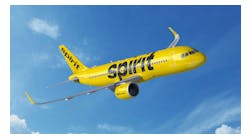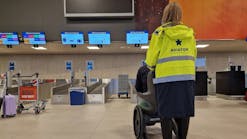Tulsa, Okla. Transport Workers Union and American Airlines Work Toward Common Goal
The airline mechanic and president of the Tulsa, Okla., chapter of the Transport Workers Union was huddled with a small group of union leaders and company management in a Sand Springs, Okla., hotel in January.
It wasn't contract re-newal time. Management wasn't asking for concessions, and labor wasn't pressing for workplace changes.
For the first time, they were working on a common goal -- finding ways to make American's Tulsa maintenance base into a profit center rather than a cost burden.
"We worked from sunup to sundown, talking about our future," Burchette said. Amazingly, he added, "Nobody dropped any F-bombs."
For Fort Worth-based American, the gathering -- which some dubbed a "come-to-Jesus meeting" -- was an extraordinary event that stemmed from an 18-month effort to bring management and labor together in a joint campaign to save the company.
With the help of a consulting firm, American has been working feverishly to overhaul the rocky relationship between labor and management. It's a goal that Gerard Arpey, American's chief executive, says is necessary if the struggling airline -- which has lost $7.3 billion since 2000 -- is going to survive.
"We all know this company's history when it comes to labor and management," said Jeff Brundage, American's senior vice president of human resources. "It wasn't very pretty."
The campaign has achieved some notable successes:
Last year, pilots worked with managers to arrange a schedule-sharing agreement with Alaska Airlines -- a type of deal that pilot unions often oppose.
When American wanted an onboard food-sales program -- which would create more work for flight attendants -- union leaders worked with management to create a sales commission for attendants, which helped them embrace the effort.
And when the airline wanted to streamline its maintenance bases -- something that typically results in layoffs -- union officials helped craft the plan, enticed by a management pledge that extra capacity would be used on outside contracts instead of cut.
One result of the maintenance overhaul is that, unlike most other major carriers, American is getting paid to perform maintenance for other airlines and companies.
A major symbol of that recently landed at American's maintenance base at Alliance Airport in Fort Worth. A Boeing jet that had been turned over by bankrupt United Airlines to an aircraft leasing company taxied into American's hanger for a maintenance check.
The airplane still sported the United paint job as it sat under the giant American logo on the hangar.
"No other airline is doing it this way," said Jim Little, the Transport Workers' international executive vice president.
In interviews, union leaders said they are impressed. They say the effort is more than just talk and describe unprecedented access to top executives and financial information.
Tommie Hutto-Blake, president of the Association of Professional Flight Attendants, said she was "floored" the first time Arpey called her to ask for her opinion on a strategy issue.
"We're used to fighting each other," she said. "But now we're all fighting for our survival."
The effort still faces serious challenges, however. Many rank-and-file workers remain unconvinced, and some have accused union leaders of selling out.
"I work with a lot of very bitter people," said Frank Granickas, a mechanic who works for American at John F. Kennedy Airport in New York. "Morale is in the toilet, no matter what people tell you."
In a recent letter to Arpey, Granickas wrote that "your plan to pull together will only work if everyone is pulling in the same direction, and morale needs to improve before that can happen."
He argued, "We are providing bad service to more people than ever."
Indeed, a recent survey of Transport Workers Union members showed a majority of ground workers want union leaders to be tougher on airline executives.
"A majority of members feel that we must be more aggressive and take on management more often," stated a summary of the survey, conducted by Abernathy Associates and Peter Hart Research Associates of Washington, D.C.
According to the survey, a majority of employees support labor-management programs, but "they must be pursued with caution."
And one-third of employees said American executives were bluffing in 2003 when they threatened to file for bankruptcy if union members rejected concessions.
Internet discussion groups for pilots and flight attendants often remain hotbeds of criticism.
"When are we going to admit that Arpey has failed?" read a recent posting from an American pilot. "All I see are our union leaders selling out to management."
Little said his union is following members' desire to treat management with caution. "We're very realistic about this and understand that it's not any kind of silver bullet," he said.
Ralph Hunter, an American pilot who heads the Allied Pilots Association, acknowledged the difficulty of spreading the cooperative spirit to the rank and file.
"This isn't really going to become effective until the line pilots are involved, and that hasn't happened yet," he said. "That's the frustrating part."
Hutto-Blake agreed. "We still have a lot of work ahead of us on the communications front," she said.
But all of the union leaders agree that the stakes are higher than they've ever been.
"If something isn't done, this company might not be around much longer," said Mike McDonald, a union activist for the Transport Workers in Tulsa. "In case you haven't heard, things are bad out there."
Hutto-Blake said, "I don't think it's a sellout to try to make this company viable again."
A key to the drive has been the Overland Resource Group, a consulting group based in Lee's Summit, Mo., that specializes in healing rifts between labor and management.
The group, hired in 2003, works jointly for the unions and executives. Either side has the right to fire the consultant if they feel the program isn't working. So far, it hasn't happened.
"Our pitch to both sides is very simple," said Robert Hughes, the firm's president. "They both have the same goal -- to make the company profitable. Without that, nobody gets what they want."
The firm's clients have included Boeing, Goodyear Tire and Ford Motor Company, among others, in partnerships with the Transport Workers, the United Auto Workers and United Steel Workers.
At Ford, Overland is credited with developing a cooperative employee-management partnership that helped keep a Kansas City assembly plant open in the early 1980s, when the industry was shuttering facilities nationwide.
Overland's goal is to create a structure within a company that puts employees and managers on equal footing when it comes to planning and strategy.
"In the past, American would start with the solution and tell everyone to do it, and we'd find out later whether it worked or not," Hunter said. "Now they come to us with the problem, and we work on finding the right solution from the beginning."
The next phase of Overland's strategy is to form committees at all levels, including from low-level employees and management. Regular meetings, with a focus on cooperation, soften the traditionally harsh relationship between the groups.
The firm also works with both sides to make meetings less confrontational.
"I used to have lots of emotional outbursts during my meetings with management; that's my nature," Burchette said. "I've gotten a lot better about that now."
If it works, employees feel more invested in the company's long-term goals. Managers no longer see union members as the enemy. And ideas for improving the business -- and making more money -- begin to flow from all areas rather than just the top.
"The real credibility comes from having people involved at the local level," Hughes said.
American's maintenance workers are the furthest along in this phase. For example, a host of cost-saving initiatives at American's maintenance base in Fort Worth were developed by mechanics and implemented after they presented the ideas to midlevel managers.
"They've worked to change the attitude among managers as well as the union workers," Little said.
In the past, union members say, management wasn't interested in new ideas. Under the Overland effort, managers are strongly urged to encourage creative thinking.
"The hardest thing to do is trust them," Burchette said. "But we're starting to get there. I know their goals are the same as mine."
If successful, a lasting partnership between labor and management would have no real precedent among the major hub airlines, which are notorious for bitter labor relations.
For American, analysts say it could mean a real competitive advantage over other airlines that continue to wrangle with unions.
"Of all of the changes going on at American, the growing signs of interaction with labor is perhaps the most impressive," James Higgins, an airline analyst with Credit Suisse First Boston, said in a recent report on the airline.
"For a company whose labor relations have historically been, in our view, in the industry's bottom tier, there truly appears to be real improvement in the works," he said.
One of the most effective weapons in Overland's arsenal is information about American Airlines' dismal financial condition.
"We're not doing this just because we're all a bunch of nice guys," Brundage said. "This is for the sake of turning the company around, which is in everybody's interest."
In Oklahoma, the "come-to-Jesus" meeting began with a long presentation by Bob Reding, American's senior vice president of operations, detailing the carrier's financial outlook.
"That was six hours of dismal gloom," Burchette said. "You wanted to cut your wrists when it ended."
But it served an important purpose. Not only did it underscore the carrier's dire financial state, it also demonstrated that management trusted the unions with closely held financial information.
"In the past, we'd find out how the company was doing after the press release was issued," said Sam Bertling, an American pilot and the union's vice president. "The reporters would find out before we would."
Both sides say the fragile state of the airline industry, which is being battered by high fuel costs and intense competition, could still overtake American's progress.
And while unions approved a $1.6 billion concessions package in 2003, there is no appetite for more cuts in salaries or benefits, officials say.
"Labor has given enough on this property," Hutto-Blake said. "I've told Arpey, the store is closed."
For his part, Arpey is trying to communicate to employees that it's time to get over the bitterness from the past.
When New York-based mechanic Granickas wrote his letter to Arpey, the chief executive quickly responded and agreed with many of his points.
"Your assessments show a good understanding of many points of our business," Arpey wrote.
But he closed his letter to the mechanic with this thought: "I'm not interested in looking backward. What is done is done."
"I'm focusing all my energy on making American successful again, and I urge you to do likewise."
Granickas said he appreciated the response but remains somewhat skeptical.
"At this point," he said, "I'm waiting to see how it goes."




